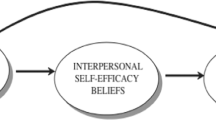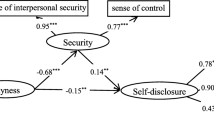Abstract
The aim of this study was to evaluate the relationship between three perceived parental attitudes and shyness, testing self-esteem and fear of negative evaluation as mediators. The study used a total of 492 undergraduate students in Turkey. Data was collected through measures of shyness, fear of negative evaluation, self-esteem, and perceived parental attitudes. The proposed model was estimated using path analysis. Goodness of fit statistics showed that the model fit the data well. Results indicated that parental acceptance/involvement predicted self-esteem; perceived parental strictness/supervision predicted fear of negative evaluation; and perceived parental psychological autonomy predicted self-esteem. Self-esteem partially mediated the relationship between parental acceptance/involvement and shyness, whereas it fully mediated the relationship between parental psychological autonomy and shyness. Fear of negative evaluation fully mediated the relationship between parental strictness/supervision and shyness. In addition, the relationship between self-esteem and shyness was partially mediated by fear of negative evaluation. The findings provided evidence for the propositions that parental attitudes are important in the development of self-image and fears of rejection which result in the experience of shyness.

Similar content being viewed by others
References
Alden, L. E., Teschuk, M., & Tee, K. (1992). Public self-awareness and withdrawal from social interactions. Cognitive Therapy and Research, 16, 249–267.
Allaman, J. D., Joyce, C. S., & Crandall, V. C. (1972). The antecedents of social desirability response tendencies of children and young adults. Child Development, 43(4), 1135–1160.
Arkin, R. M., Lake, E. A., & Baumgardner, A. B. (1986). Shyness and self-presentation. In W. H. Jones, J. M. Cheek & S. R. Briggs (Eds.), Shyness: Perspectives on research and treatment, pp. 189–203. New York: Plenum.
Baumrind, D. (1968). Authoritarian vs. authoritative control. Adolescence, 3, 255–272.
Baumrind, D. (1971). Current patterns of parental authority. Developmental Psychology Monograph, 4, 1–103.
Baumrind, D. (1989). Rearing competent children. In W. Damon (Ed.), Child development today and tomorrow, pp. 349–378. San Francisco: Jossey-Bass.
Bögels, S. M., van Oosten, A., Muris, P., & Smulders, D. (2001). Familial correlates of social anxiety in children and adolescents. Behavior Research and Therapy, 39, 273–287.
Bruch, M. A. (1989). Familial and developmental antecedents of social phobia: Issues and findings. Clinical Psychology Review. Special Issue: Social phobia, 9, 37–47.
Bruch, M. A., & Heimberg, R. G. (1994). Differences in perceptions of parental and personal characteristics between generalized and nongeneralized social phobics. Journal of Anxiety Disorders, 8, 155–168.
Bruch, M. A., & Cheek, J. M. (1995). Developmental factors in childhood and adolescent shyness. In R. G. Heimberg, M. G. Liebowitz, D. A. Hope & F. R. Schneier (Eds.), Social phobia: Diagnosis, assessment, and treatment, pp. 163–182. New York: Guilford.
Buri, J. R. (1989). Self-esteem and appraisals of parental behavior. Journal of Adolescent Research, 4, 33–49.
Buri, J. R., Louiselle, P. A., Misukanis, T. M., & Mueller, R. A. (1988). Effects of parental authoritarianism and authoritativeness on self-esteem. Personality and Social Psychology Bulletin, 14, 271–282.
Cheek, J. M., & Buss, A. H. (1981). Shyness and sociability. Journal of Personality and Social Psychology, 41, 330–339.
Cheek, J. M., & Briggs, S. R. (1990). Shyness as a personality trait. In W. R. Crozier (Ed.), Shyness and embarrassment: Perspectives from social psychology, pp. 315–337. Cambridge: Cambridge University Press.
Chen, X., Rubin, K. H., & Li, B. (1995). Social and school adjustment of shy and aggressive children in China. Development and Psychopathology, 7, 337–349.
Crozier, W. R. (1995). Shyness and self-esteem in middle childhood. British Journal of Educational Psychology, 65, 85–95.
Çuhadaroğlu, F. (1985). Adolesanlarda benlik saygısı. [Self-esteem in adolescents]. Unpublished Doctoral Dissertation, Hacettepe Üniversitesi, Ankara.
Eastburg, M., & Johnson, W. B. (1990). Shyness and perceptions of parental behavior. Psychological Reports, 66, 915–921.
Gecas, V. (1972). Parental behavior and contextual variations in adolescent self-esteem. Sociometry, 35(2), 332–345.
Göregenli, M. (1997). Individualist and collectivist tendencies in a Turkish sample. Journal of Cross-Cultural Psychology, 28, 787–793.
Haque, A. (1988). Relationship between perceived maternal acceptance-rejection and self-esteem among young adults in Nigeria. Journal of African Psychology, 1, 15–24.
Hill, N. E. (1995). The relationship between family environment and parenting style: A preliminary study of African American families. Journal of Black Psychology, 21, 408–423.
Hudson, J. L., & Rapee, R. M. (2000). The origins of social phobia. Behavior Modification, 24, 102–129.
Hummel, R. M., & Gross, A. M. (2001). Socially anxious children: An observational study of parent-child interaction. Child & Family Behavior Therapy, 23, 19–42.
İmamoğlu, E. O. (1987). An interdependence model of human development. In Ç. Kagitcibasi (Ed.), Growth and progress in cross-cultural psychology, pp. 138–145. Lisle, The Netherlands: Swets and Zeitlinger.
İmamoğlu, E. O. (2003). Individuation and relatedness: Not opposing but distinct and complementary. Genetic, Social and General Psychology Monographs, 129(4), 367–402.
İmamoğlu, E. O., & Karakitapoğlu Aygün, Z. (2004). Self-construals and values in different cultural and socioeconomic contexts. Genetic, Social and General Psychology Monographs, 130(4), 277–306.
Jones, W. H., Briggs, S. R., & Smith, T. G. (1986). Shyness: Conceptualization and measurement. Journal of Personality and Social Psychology, 51(3), 629–639.
Jöreskog, K. G., & Sörbom, D. (1993). Structural equation modeling with the SIMPLIS command language. Chicago: Scientific Software International.
Kagitcibasi, C. (1996). Family and human development across cultures: A view from the other side. Hillsdale: Erlbaum.
Karakitapoğlu-Aygün, Z., & İmamoğlu, E. O. (2002). Value domains of Turkish adults and university students. The Journal of Social Psychology, 142, 333–351.
Kelloway, E. K. (1998). Using lisrel for structural equation modeling. London: Sage Publications.
Khaleque, A., & Rohner, R. P. (2002a). Perceived parental acceptance-rejection and psychological adjustment: A meta-analysis of cross cultural and intracultural studies. Journal of Marriage and the Family, 64, 54–64.
Khaleque, A., & Rohner, R. P. (2002b). Reliability of measures assessing the pancultural association between perceived parental acceptance-rejection and psychological adjustment: A meta-analysis of cross-cultural and intracultural studies. Journal of Cross-Cultural Psychology, 33, 87–99.
Kocovski, N. L., & Endler, N. S. (2000). Social anxiety, self-regulation, and fear of negative evaluation. European Journal of Personality, 14, 347–358.
Koydemir, S. (2006, June). Association of relational, individual, and collective self-aspects with social anxiety among Turkish university students. Paper presented at the 4th International Conference on the Diological Self, Braga, Portugal.
Koydemir, S, & Demir, A. (2005). [Reliability and validity of 13-item Cheek and Buss Shyness Scale]. Unpublished manuscript.
Koydemir, S., & Demir, A. (2007). Psychometric properties of the brief version of the Fear of Negative Evaluation Scale. Psychological Reports, 100, 883–893.
Lamborn, S. D., Mounts, N. S., Steinberg, L., & Dornbusch, S. M. (1991). Patterns of competence and adjustment among adolescents from authoritative, authoritarian, indulgent, and neglectful families. Child Development, 62, 1049–1065.
Leary, M. R. (1983). A brief version of the Fear of Negative Evaluation Scale. Personality and Social Psychology Bulletin, 9, 371–376.
Leary, M. R. (1986). Affective and behavioral components of shyness: Implications for theory, measurement, and research. In W. H. Jones, J. M. Cheek & S. R. Briggs (Eds.), Shyness: Perspectives on research and treatment, pp. 27–38. New York: Plenum.
Leary, M. R., & Kowalski, R. M. (1993). The interaction anxiousness scale: Construct and criterion related validity. Journal of Personality Assessment, 61, 136–146.
Leary, M. R., & Kowalski, R. M. (1995). Social anxiety. NY: The Guilford.
Maccoby, E. E., & Martin, J. A. (1983). Socialization in the context of the family: Parent—child interaction. In P. H. Mussen & E. M. Hetherington (Eds.), Handbook of child psychology: Socialization, personality, and social development (4th ed), pp. 1–101. New York: Wiley.
Markus, H. R., & Kitayama, S. (1991). Culture and the self: Implications for cognition, emotion, and motivation. Psychological Review, 98, 224–53.
Mesquita, B., & Frijda, N. H. (1992). Cultural variations in emotions: A review. Psychological Bulletin, 112, 179–204.
Mills, R. S. L., & Rubin, K. H. (1993). Socialization factors in the development of social withdrawal. In K. H. Rubin & J. Asendorpf (Eds.), Social withdrawal, inhibition, and shyness in childhood, pp. 117–148. New Jersey: Erlbaum.
Mocan-Aydın, G. (2000). Western models of counseling and psychotherapy within Turkey: Crossing cultural boundaries. Counselling Psychologist, 28, 281–299.
Rapee, R. M., & Heimberg, R. G. (1997). A cognitive-behavioral model of anxiety in social phobia. Behaviour Research and Therapy, 35, 741–756.
Rice, K. G. (1990). Attachment in adolescence: A narrative and meta-analytic review. Journal of Youth and Adolescence, 19(5), 511–538.
Rosenberg, M. (1965). Society and the adolescent self-image. Princeton: Princeton University Press.
Schlenker, B. R., & Leary, M. R. (1982). Social anxiety and self-presentation: A conceptualization and model. Psychological Bulletin, 92, 641–669.
Steinberg, L., Elmen, J. D., & Mounts, N. S. (1989). Authoritative parenting, psychosocial maturity, and academic success among adolescents. Child Development, 60, 1424–1436.
Steinberg, L., Lamborn, S. D., Darling, N., Mounts, N. S., & Dornbusch, S. M. (1994). Over-time changes in adjustment and competence among adolescents from authoritative, authoritarian, indulgent, and neglectful families. Child Development, 65, 754–770.
Watson, D., & Friend, R. (1969). Measurement of social-evaluative anxiety. Journal of Consulting and Clinical Psychology, 33(4), 448–457.
Yılmaz, A. (2000). Eşler arasındaki uyum ve çocuğun algıladığı anne-baba tutumu ile çocukların, ergenlerin ve gençlerin akademik başarıları ve benlik arasındaki ilişkiler. [Relationships between marital adjustment, child perception of parenting style, and children’s, adolescents’, and young adults’ academic achievement and self-perceptions]. Unpublished Doctoral Dissertation, Hacettepe University, Ankara, Turkey.
Author information
Authors and Affiliations
Corresponding author
Rights and permissions
About this article
Cite this article
Koydemir-Özden, S., Demir, A. The Relationship Between Perceived Parental Attitudes and Shyness among Turkish Youth: Fear of Negative Evaluation and Self-esteem as Mediators. Curr Psychol 28, 169–180 (2009). https://doi.org/10.1007/s12144-009-9054-1
Published:
Issue Date:
DOI: https://doi.org/10.1007/s12144-009-9054-1




